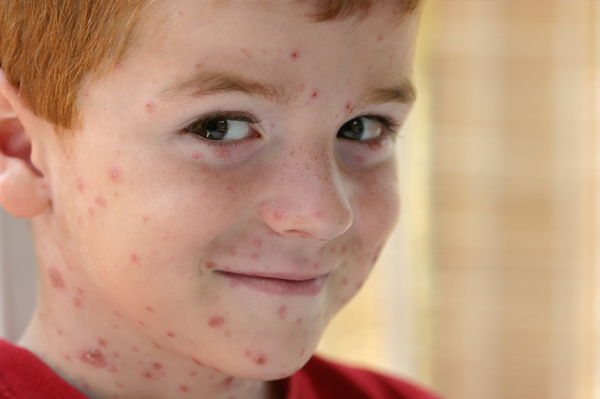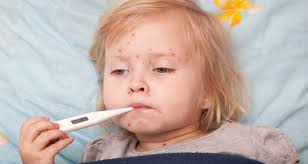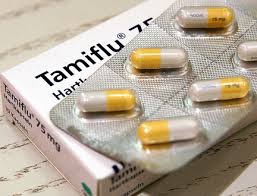Chickenpox in children is a common disease that children experience especially by the age of 12. When chickenpox triggers in children, a parent notices immediately because besides specific symptoms of a mild cold (runny nose, mild sore throat, mild fever), the child’s body is filled with itchy red spots. Symptoms usually pass without any special treatment, but chickenpox is highly contagious, so infected children should stay home and rest as much as possible until the symptoms disappear.
About chickenpox were published and are available many documentations. A parent faced with this condition can find everything about it with a simple search on Google or reading books or magazines. At that time, they are faced with dozens of information, which are more or less important. Here are the top ten most important information that is vital to know about chickenpox.
1. Chickenpox is caused by a virus and is highly contagious
Varicella zoster virus – which is part of the same family as herpes – is responsible for chickenpox. The virus is spread through contact with an infected person. The virus spreads by contact with the red spots, but also in the air when a person coughs or sneezes. Experts say that a person who is not immunized from chickenpox and is exposed to this virus through the paths mentioned above has 70-80 % chance of contamination.
The child who gets sick of chickenpox will be kept at home between seven and ten days to recover and not get other children sick.
2. Chickenpox causes hives
The main symptom of chickenpox lies in the rapid spread on a large body surface of small itchy bumps that appear like small gentle mosquito bite, followed in a few days by a change in their appearance. These bumps appear on the head, face and then the trunk, arms, legs, nose, mouth, eyes, genitals.
3. Complications of chickenpox can be serious
Most children recover completely after chickenpox. Some children also have stomach pain, sore throat, headache or a bad mood 2 days before the first eruption and these symptoms can last 3-4 days while fever lasts for between 37.7 -38.8 degrees C.
However, there are people, especially adults and adolescents who may have serious complications, including bacterial infection requiring treatment with antibiotics or pneumonia or brain disorders. Equally, people suffering from serious illnesses and have a compromised immune systems may be affected even fatally by chickenpox.
4. Chickenpox is dangerous to pregnant women
Pregnant women who have chickenpox can transmit the virus to the unborn child. An infection in the first trimester is the most dangerous because it can cause a condition called congenital varicella syndrome characterized by unwanted effects at birth. This syndrome can also lead to miscarriage. Equally, infection with chickenpox 4-5 weeks before birth puts the baby at risk to develop chickenpox at birth, which can be severe for the fetus or even fatal.
5. The incubation period for chickenpox is within 3 weeks
Most children / people start having symptoms of chickenpox between 2 and 3 weeks after being exposed to the virus either from a person with chickenpox or a person infected with the virus and carrying it. The person who is ill is contagious from the first two days before the first eruption and will continue to be contagious until all the scabs will fall. Families with 2 children experience illness of both, one after another, spaced 2 weeks. To avoid spreading the virus, make sure that children wash their hands often, especially before eating and after using the bathroom.
6. Chickenpox usually gives lifetime immunity
Most of what they did chickenpox will never get sick again. There are some people who will not be immunized for life and can experience later in their lives this disease.
7. Varicella virus is responsible for the disease called shingles
Varicella zoster virus never goes away from the body. It remains latent and may reactivate in favorable conditions, stress and low immunity, causing shingles, a disorder characterized by itchy bumps, usually located on one side of the body. Statistically, 20 % of people who have had chickenpox will also have shingles later in their lives.
8. A Varicella vaccine is available
To vaccinate means to protect children from severe forms of chickenpox or shingles later in life, because the vaccine helps the immune system form antibodies against this disease. There are rare side effects of this vaccine when administered together or very close with the mixed vaccine against rubella and measles.
9. Never give aspirin to a child with chickenpox
If your child has chickenpox, under no circumstances, you may give him any medicine that is based on aspirin. The combination of this type of virus and aspirin can cause Reye’s syndrome, a disease that attacks the liver and brain and can be fatal.
10. The only medicines that can treat chickenpox are antiviral
Chickenpox is caused by a virus, so treatment for it can only be antiviral, antibiotics being totally useless. They are prescribed only if the child develops any complications from chickenpox, the most common are skin infections caused by scratching.











Leave a Reply